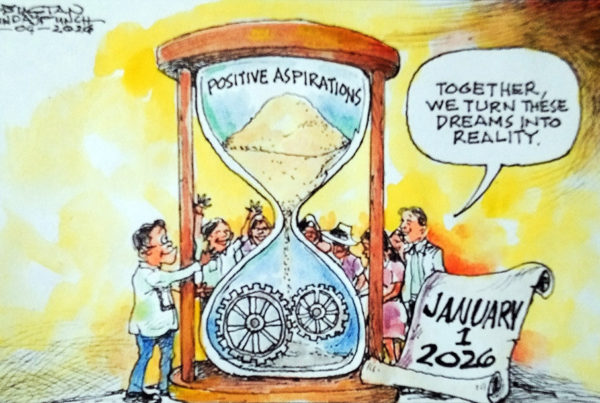Editorial
Economic sabotage
CUTTING cable wires that are suspended on poles and fully exposed is one thing. Digging up wires that are buried in the ground is another thing – a sign of a situation worsening. The theft of underground electric wires for the roadside lights along the Jose R. de Venecia Expressway Extension is an indication that the perpetrators of the rampant cable pilferage in the province have become bolder because it is more tedious to excavate and thus the risk of capture is higher. But the cable thieves do not appear to be worried.
The problem of cable theft – which includes transmission lines and tower parts of the National Transmission Corporation, wires of telecommunication companies, and now electricity wires – has been going on for years. In 2006, then Police Provincial Director Sr. Supt. Alan Purisima even formed a ‘Task Force Spaghetti’ to go after cable thieves. In the years since then, reports of the arrest of members of the so-called Spaghetti Gang suspected to be responsible for the pilferage are far and between. Without a doubt, the crime continues with impunity.
Unless and until the police utilizes its intelligence fund for the purpose of identifying and stopping the cable crooks, it’s not likely that the thieving spree will stop. Asking junkshop owners to cooperate is part of the solution but realistically, that is tantamount to asking these business owners to give up on their lucrative trade on copper, legal or not. Local ordinances should be passed to reinforce the law on theft so that cable pilferage can be treated as a major economic sabotage because that is what it actually is considering the impact on energy, communication, and transportation, not to mention security. Cables thieves and those who buy their stolen goods should not be allowed to get off easily, and stiffer penalties and punishment should make them think twice.
Police authorities say barangay officials are already being tapped as force multipliers. That role should be strengthened by putting the barangay leaders at the forefront of the “Spaghetti” campaign since it is the communities that can monitor the presence and movements of strangers and junkshops in their neighborhoods.
* * * * * *
4-day work per week
INDEED, why not a four-day work per week for both the private and public sectors?
Work begins on Monday and ends on Thursday. But instead of an eight-hour shift, it should now be a 10-hour duty. From 7am to 12nn and from 1pm to 5pm for a similar total of 40 hours a week in a five-day work schedule. Nothing’s changed, except the workdays from five to four per week. If made into law, that would mean a well-deserved three-day rest for our people/manpower, who take the brunt of toiling in the present five-day work per week.
Imagine the savings we will realize from reduced consumption of water and electricity in offices and factories closed for three days a week, not to mention our workforce enjoying reduced expenses on fares and other incidentals on or off the work areas?
Paging Congress. About time we did it.









